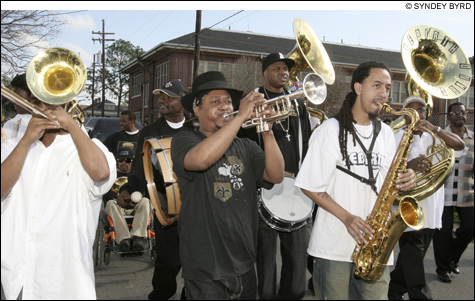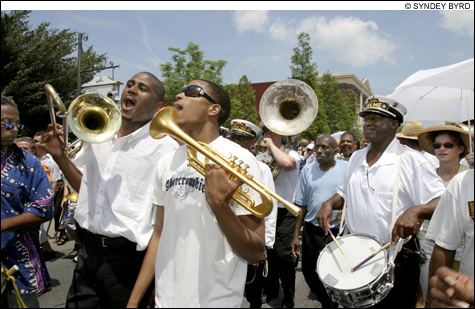
REBIRTH BRASS BAND: Celebrating Joel Neville, the wife of Aaron, with former bandmate Kermit Ruffins (center), January 2007. |
Three weeks after Katrina ripped through the Gulf Coast, nearly 5000 desperate evacuees from New Orleans were still living in a Red Cross shelter in Baton Rouge. When they heard a tuba outside, their hearts reset to a bubbling beat. Then other instruments joined in — trumpets, trombones, a saxophone, and drum. The members of the Hot 8 Brass Band appeared in the doorway and beckoned the crowd outside. Children fell on the ground laughing, while parents danced and sang. It was the sound of home.
“When the band started to play,” says Raymond “Dr. Rackle” Williams — a Hot 8 trumpeter in Baton Rouge that day — “it took the people’s minds off things. The band sang that New Orleans would come back. That made us feel good. It felt like we weren’t just musicians; we felt like we were leaders. Music can heal people. It was kind of like we were doctors ... or healers.”
The healing power of music has always helped the people of New Orleans find the will to carry on through hard times. Since Katrina, musicians have found additional prestige and respect. Yet they are subject to the same concerns other residents of the city face: housing shortages, crime, and the steady erosion of a culture they hold dear.
Some fine examples of New Orleans’s unique music — courtesy of blues-rock singer/songwriter Dr. John, the Rebirth Brass Band, and jazz pianist Henry Butler — are coming to Portsmouth, New Hampshire, Sunday evening. Natives to the core, all have worked tirelessly to keep the city’s music and culture alive. Only Rebirth still resides in the Big Easy, where its funked-up sound brings hope to some of the city’s poorest — and most devastated — neighborhoods. If you want a look at the in-your-face vitality of these neighborhoods, you’ll find it in the sound of Rebirth Brass Band. For more than a century, brass band musicians have worked their magic in New Orleans’s “back a’ town” neighborhoods that celebrate life and death with music. In the gritty mix of stripped-down Afro-Caribbean rhythms and European marching band instruments, people find solace, joy, and strength in each other’s company. Brass band music radiates pleasure in a life well lived. It also calls out for freedom from injustice. These messages have taken on additional meaning where neighborhoods — and the culture nourished there — may never recover from the storm.
“If there’s anything worth saving in New Orleans it’s brass band music,” says Baty Landis, who teaches music history at Tulane University. “It’s the cultural essence of the city. It’s the madeline in a Proust novel — a detail that carries a lot of weight. The sound of a brass band can be overwhelming.”

FUNERAL MARCH: Musicians thrive and exult in processions honoring the dead. |
Under attack
Rebirth’s leader Philip Frazier says the band has been playing with greater passion since the storm. “We appreciate our culture even more now.” But Frazier admits the traditions are at risk. “It’s important for us to keep a positive state of mind and a strong will. Our music is physical, mental, and spiritual.”Founded in 1982 from members of one of the best high-school marching bands in the city, they began to fold in nontraditional rhythms almost immediately.